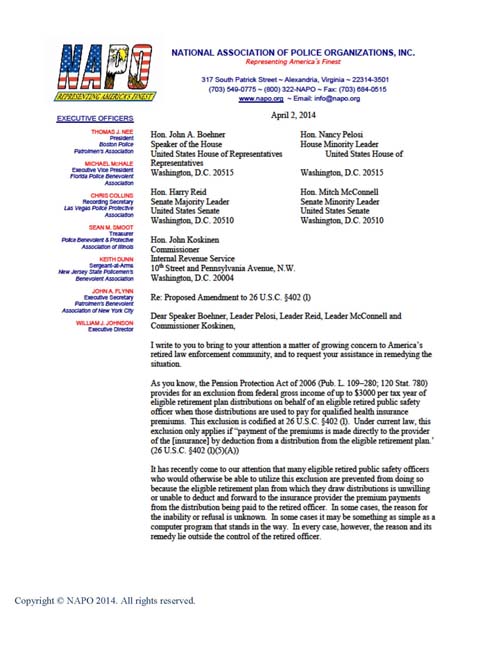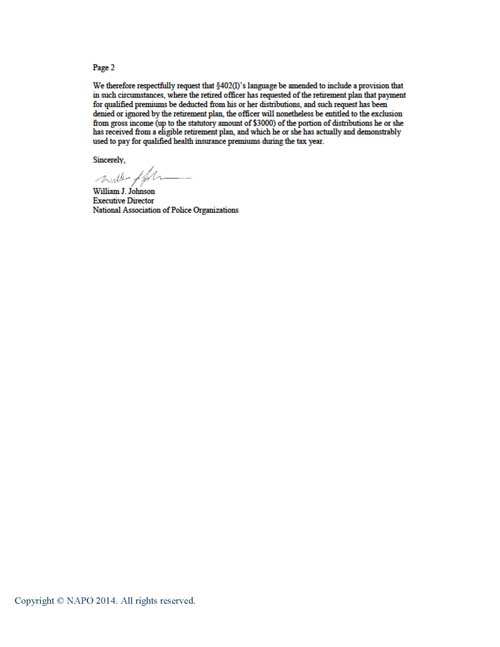
NAPO Pursues Passage of Second Chance Reauthorization Act; NAPO Lobbies Capitol Hill to Push Important Changes in IRS Rules for Retired Officers’ Health Care; NAPO Attends NCJA Brown Bag; and DHS Announces Grant Allocations for FY 2014 Preparedness Grants
July 28, 2014NAPO WASHINGTON REPORT
NAPO Pursues Passage of Second Chance Reauthorization Act
NAPO continues to aggressively pursue the passage of the Second Chance Reauthorization Act. On July 16, 2014, NAPO participated in a conference call with senior staffers for the bill’s sponsor, Senator Patrick Leahy (D-VT), to strategize ways forward to ensure passage of the bill. Teleconference participants agreed to continue to reach out to key members of Congress to request support for the bill.
Following the teleconference, NAPO participated in a meeting with Senator Richard Burr’s (R-NC) senior staff to discuss the Second Chance Reauthorization Act. During the meeting, NAPO highlighted our support of the legislation, which improves state and local grant programs to promote successful prisoner reentry and improve public safety. This legislation continues targeted funding for reentry programs at the state and local level that have been proven to reduce recidivism, lead to better outcomes for those released from prison, and save prison costs.
Senator Burr’s staff was very receptive to our proposal. We are hopeful that the Senator will sign-on as a cosponsor of the bill, which currently holds strong bipartisan support in both the House and Senate.
NAPO looks forward to continuing to work with fellow stakeholders to pass this important legislation. If you have any questions about the Second Chance Reauthorization Act, please contact Melissa Nee at: mnee@napo.org.
NAPO Lobbies Capitol Hill to Push Important Changes in IRS Rules for Retired Officers’ Health Care
On July 25, 2014, NAPO participated in a discussion with senior staffers for Congressman Steven Horsford (D-NV). NAPO used the discussion to provide details on an issue that is currently impacting retired public safety officers in Nevada. Specifically, the Pension Protection Act of 2006 (Pub. L. 109–280; 120 Stat. 780) provides for an exclusion from federal gross income of up to $3,000 per tax year of eligible retirement plan distributions on behalf of an eligible retired public safety officer when those distributions are used to pay for qualified health insurance premiums. This exclusion is codified at 26 U.S.C. §402 (l). Under current law, this exclusion only applies if “payment of the premiums is made directly to the provider of the [insurance] by deduction from a distribution from the eligible retirement plan” (26 U.S.C. §402 (l)(5)(A)).
Many eligible retired public safety officers who would otherwise be able to utilize this exclusion are prevented from doing so because the eligible retirement plan from which they draw distributions is unwilling or unable to deduct and forward to the insurance provider the premium payments from the distribution being paid to the retired officer. In some cases, the reason for the inability or refusal is unknown. In some cases it may be something as simple as a computer program that stands in the way. In every case, however, the reason and its remedy lie outside the control of the retired officer.
NAPO has proposed an amendment to the tax code, which would allow retired officers to benefit from the income exclusion, provided they have verifiable insurance premium expenses. (NAPO’s letter regarding proposed language modifications is attached to this report for your convenience and review).
Congressman Horsford’s staff continues to be very supportive of NAPO’s efforts, and we look forward to working with the Congressman and his staff to pursue amending the language of §402 (l). NAPO will continue to advocate for our proposed remedy, and keep our members updated on the status of this initiative. If you have any questions about NAPO’s proposed rule change, please contact Bill Johnson at: bjohnson@napo.org.
NAPO Attends the National Criminal Justice Association Brown Bag
On July 14, 2014, NAPO attended the monthly National Criminal Justice Association (NCJA) Brown Bag. A senior staffer for Senator Chris Murphy (D-CT) attended the meeting to provide information on a bill that Senators Murphy and Cory Booker (D-NJ) introduced on June 25, 2014, the Better Options for Kids Act. This bill would incentivize states to replace overly harsh school disciplinary actions and juvenile court punishments with bipartisan, evidence-based solutions that save money, enhance public safety, and improve youth outcomes.
Recent studies have demonstrated that incarcerated youth are likely to experience a lower income earning capacity, become more reliant on government social programs as an adult, and are more likely than their peers to end up in the adult criminal justice system. On average, the state of Connecticut spends $134,000 per year to incarcerate just one child. In New Jersey, in 2013, it cost the state on average $136,000. Typically, juveniles are sentenced for nonviolent or minor offenses that could be punished using alternative options. The high social and economic costs related to incarcerating a child are unsustainable and experts agree that federal legislation is needed to help avoid youth incarceration when possible.
Senators Murphy and Booker have introduced the Better Options for Kids Act because they believe the federal government can incentivize states to adopt policies that improve youth outcomes and avoid using incarceration as the solution. This legislation prioritizes certain competitive Substance Abuse and Mental Health Services Administration (SAMHSA) grants to community-based organizations in states that have already implemented, or will use the funds to implement specific best-practice policies to get at-risk youth back on the right track. Specifically, this bill incentivizes states with the following, results-oriented policies:
- Limiting court referrals for non-criminal offenses
- Establishing clear guidelines regarding the role of school resource officers
- Providing training for school districts on non-exclusionary discipline
- Adopting a reentry policy for youth leaving correctional facilities
NAPO is currently reviewing the bill, and will keep our members updated on the status of this legislation. If you have any questions about this bill, please contact Melissa Nee at: mnee@napo.org.
Source:
"To Help Reduce Youth Incarceration, Murphy, Booker Introduce Bill to Encourage State Policies that Lead to Better Youth Outcomes,” U.S. Senator Chris Murphy of Connecticut." Press Release. Senator Chris Murphy, 25 June 2014. Web. 28 July 2014. <http://www.murphy.senate.gov/newsroom/press-releases/to-help-reduce-youth-incarceration-murphy-booker-introduce-bill-to-encourage-state-policies-that-lead-to-better-youth-outcomes>.
DHS Announces Grant Allocations for Fiscal Year 2014 Preparedness Grants
As part of the U.S. Department of Homeland Security’s (DHS) ongoing efforts to support state, local, tribal, and territorial partners, Secretary Jeh Johnson announced final allocations for seven FY 2014 DHS preparedness grant programs, including the Homeland Security Grant Program (HSGP), Port Security Grant Program (PSGP), and Transit Security Grant Program (TSGP). These seven allocations total more than $1.6 billion to assist states, urban areas, tribal and territorial governments, non-profit agencies, and the private sector.
“Homeland security grants have demonstrated time and again that funding for preparedness capabilities ensure our nation is better equipped to respond to a range of threats, disasters and incidents,” said Secretary Johnson. “By working with our partners at all levels of government to focus our limited resources, the FY 2014 homeland security grant allocations will better support our current homeland security missions, and address our ongoing preparedness efforts.”
The FY 2014 preparedness grant allocations demonstrate the Department’s ongoing commitment to securing our borders and ports of entry, and continue to focus on the nation’s highest risk areas, including urban areas that face the most significant threats. At the direction of the Secretary, increased funding has been allocated to law enforcement agencies to support the U.S. Customs and Border Protection missions along the southwest border—enhancing security efforts in the region, and funding more southwest border counties than ever before.
Consistent with previous grant guidance, dedicated funding is provided for law enforcement and terrorism prevention activities throughout the country to prepare for, prevent, and respond to pre-operational activity and other crimes that are precursors or indicators of terrorist activity.
Together, with previous grant funding awarded since 2002, DHS has awarded over $40 billion to its state, local, tribal, territorial, and private sector partners. Preparedness grants strengthen our nation’s ability to prevent, protect against, mitigate, respond to, and recover from terrorist attacks, major disasters, and other emergencies in support of the National Preparedness Goal and the National Preparedness System.
Below please find a breakdown of the Preparedness Grant Program Allocations for Fiscal Year 2014:
Homeland Security Grant Program (HSGP)—Provides more than $1 billion for states and urban areas to prevent, protect against, mitigate, respond to, and recover from acts of terrorism and other threats.
- State Homeland Security Program (SHSP)—Provides more than $401 million to support the implementation of the National Preparedness System to build and strengthen preparedness capabilities at all levels.
- Urban Areas Security Initiative (UASI)—Provides $587 million to enhance regional preparedness capabilities in 39 high-threat, high-density areas.
- Operation Stonegarden (OPSG)—Provides $55 million to enhance cooperation and coordination among local, tribal, territorial, state, and Federal law enforcement agencies to jointly enhance security along the United States land and water borders where there are ongoing U.S. Customs and Border Protection missions.
(The 9/11 Act requires states to dedicate 25 percent of their total allocation under the SHSP and UASI programs towards law enforcement terrorism prevention activities (LETPA). The total LETPA allocation can be drawn from SHSP, UASI, or both).
Emergency Management Performance Grants (EMPG) Program—Provides over $350 million to assist local, tribal, territorial, and state governments in enhancing and sustaining all-hazards emergency management capabilities.
Tribal Homeland Security Grant Program (THSGP)—Provides $10 million to eligible tribal nations to implement preparedness initiatives to help strengthen the nation against risk associated with potential terrorist attacks and other hazards.
Nonprofit Security Grant Program (NSGP)—Provides $13 million to support target hardening and other physical security enhancements for nonprofit organizations that are at high risk of a terrorist attack and located within one of the 39 FY 2014 UASI-eligible urban areas.
Intercity Passenger Rail - Amtrak (IPR) Program—Provides $10 million to protect critical surface transportation infrastructure and the traveling public from acts of terrorism and increase the resilience of the Amtrak rail system.
Port Security Grant Program (PSGP)—Provides $100 million to help protect critical port infrastructure from terrorism, enhance maritime domain awareness, improve port-wide maritime security risk management, and maintain or reestablish maritime security mitigation protocols that support port recovery and resiliency capabilities.
Transit Security Grant Program (TSGP)—Provides more than $90 million to owners and operators of transit systems to protect critical surface transportation and the traveling public from acts of terrorism and to increase the resilience of transit infrastructure.
In addition to fighting domestic crime, law enforcement is assuming more duties to protect America’s communities against terrorist threats. Since the beginning of the 108th Congress, NAPO has expended great efforts every fiscal year to urge Congress to fund these vital programs.
NAPO will continue to keep our members updated on the status of these important grants. If you have any questions about the DHS grants summarized above, please contact Melissa Nee at: mnee@napo.org.
Source:
Department of Homeland Security. DHS Announces Grant Allocations for FY 2014 Preparedness Grants. DHS. DHS, 25 July 2014. Web. 25 July 2014. <http://www.fema.gov/grants>.
Please monitor NAPO’s website www.napo.org, and Facebook page: National Association of Police Organizations, and follow us on Twitter at NAPOpolice for breaking news and updates.

